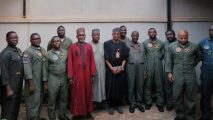10, November 2019
Southern Cameroons Crisis: Cardinal Tumi says Christians should become more involved in politics 0
Every Christian is a “rebel against evil,” according to Cameroon’s lone cardinal.
Speaking during a program on Cameroonian state television, Cardinal Christian Tumi also called on Christians to become more involved in politics.
“Every Christian is a rebel against all that is not good-that is morally evil. A Christian is a rebel against lies,” Tumi said.
“Politics is part of the world and Christ has told us: Go into the whole world and proclaim the Gospel message. Wherever there is man acting; the Church has to be present,” he said.
“We are therefore called to evangelize the politicians and politics, because their activity also is preparing them for the kingdom of God. There is no activity that is out of the region of the church,” Tumi continued.
The program brought together Christian leaders from different denominations to discuss relations between Church and State in the West African country, which is currently experiencing a number of crises, including a rebellion in the country’s two English-speaking provinces. Cameroon is 80 percent French-speaking, and the Anglophone minority has long complained about discrimination and marginalization by the Francophone majority.
Around 70 percent of the country’s population is Christian, almost evenly divided between Catholics and Protestants.
During the program, the President of the Cameroon Baptist Convention, Reverend Godwill Ncham, said he believed in the separation of Church and State, but insisted it doesn’t mean that “the Church or Christians cannot be involved in politics.”
“It is intended to create boundaries so that as a Christian when you get involved in politics, you don’t turn the political platform into a Church,” the Baptist minister said.
“So I believe the dichotomy of Christians not involved in politics is not true to scripture, because the Christian life calls the Christian to engage all of life. There is also the false dichotomy of circular and sacred. I am first a Christian before a pastor; and my Christian life calls me to engage the traditional sinful background from which I come unto transformation, and I am supposed to engage others and bring them to transformation as well .So to say that a Christian should not be involved in politics because he would dirty himself is inadequate. A Christian should be involved in politics in order to clean up the politics,” Ncham continued.
Tumi even said that if had not become a Catholic priest, he would have become a politician.
“Politics is good. Take for instance; President Paul Biya. He will answer for the role he has played as the head of state of a people of God. The people in every country are the people of God, created by Him. Every power comes from God, and therefore they must exercise power with fear, and look at their power as occasions to serve,” the cardinal said.
Tumi criticized politicians for telling lies and making promises they never intend to keep, and said Christian politicians should be able to inject truth into politics.
“The Truth is the agreement between what I am saying and what I am thinking. If what I am thinking contradicts what I am saying, I am telling a lie. And we pastors have been called and sent by God to promote the truth. Christ is the truth. ‘I am the Truth, I am the light, I am the way,’ says Christ. The truth is objective. If it is not objective, it’s not true,” he explained.
Tumi said the Christian’s mission should also be to sanitize politics, because “Christ came to save the sinner, not the saint.”
“So where sin abounds, the Grace of God also abounds. So therefore, wherever a human being is found-be he or she good or bad, we have to be there to try to bring the lost child back to the fold,” he said.
The Christian leaders were unanimous that the state was “at war” against the Church.
The Moderator of the Presbyterian Church, Rt. Rev. Samuel Fonki Forba, accused the government of undermining religious studies.
“Religious studies in our schools should not be mocked and treated as a side issue,” he said.
“What is happening in our country is because the morals of our society have gone down the drain, and we must do something to keep those morals. When things are bad, that’s when they (political leaders) call on religious leaders to come and have an ecumenical prayer session for the nation,” Forba continued.
“When things are moving the way they want them to move, the Church is not recognized. And so we are saying that we have a lot to offer; to partner with the state of Cameroon to change the present dispensation. They must recognize the role of the Church in all of this,” he said.
Tumi was even more harsh in his criticism of the government, reprimanding the state for excluding religious studies in competitive examinations for professional schools.
“It’s a fight against us. It’s a fight by the government against us,” the cardinal said.
“You are telling the children that religion is not so important, and it betrays your ignorance. The highest university in England is Oxford University and the highest degree you get in Oxford University is DD – Doctor of Divinity, and that’s religion,” he said.
The animosity of the Cameroonian government against the Church reached a head in 2017 when the Archbishop Cornelius Fontem Esua of Bamenda, his auxiliary Bishop Michael Bibi, Bishop George Nkuo of Kumbo, two priests – Fathers Michael Kintang and William Neba – and ministers from other denominations were dragged to court for statements made in connection with the Anglophone crisis in Cameroon’s North West and South West regions.
Ncham said such extreme measures by the state are to be expected.
“The Church being taken to court is expected, because if you look at the Sermon on the Mount, Jesus says: ‘Blessed are the peacemakers, blessed are those who thirst after righteousness’; and he says those who are peacemakers and who thirst after righteousness will be persecuted. So we consider the being taken to court as being part of the persecution of the Church trying to fill its role in the community,” the Baptist minister said. “And it shouldn’t hurt us to produce wounds that will not heal, it should fortify us to be resilient to continue to play our role in the community.”
Source: Crux
























21, November 2019
Uncovering Moderator Fonki Samuel’s sin and Corruption in the Presbyterian Church in Cameroon 0
The leadership of the Presbyterian Church in Cameroon (PCC) was engineered to be rooted in the stability of a relationship with God and the simplicity of a life that is straightforward and open. This rootedness in a God-centered life of righteousness enables Moderators of the PCC to face the confusion and conflicts that arise as a result of morally wrong motives, relationships and actions and are peacemakers.
This has not been the case with the PCC ever since the man they call Reverend Fonki Samuel Forba took over command. Recently in Buea and under the direct supervision of the French Cameroun governor of the South West Region, the Right Reverend Samuel Fonki was re-elected as Moderator of the Presbyterian Church in Cameroon for the next five years.
The well fed Fonki Samuel was elected on Monday at the end of the 50 Synod. His acolyte Reverend Hans Abia of the Presbyterian Church Bonamoussadi was also elected Synod clerk in a counterfeit electoral process never known in the history of the PCC.
The two so-called men of God were given the five year mandate unopposed after their challengers were all forced to step down by French Cameroun security agents. The CPDM style of voting still had to go on and the Rt. Rev. Samuel Fonki was declared winner with 119 votes.
After the elections, a concerned child of God painted the PCC on social media using the following words “The Presbyterian Church in Cameroon has become a political church (house) where pastors do campaign for a post to govern rather than to ask God for wisdom to lead his Christians. Shared monies and under looked other pastors rather than praying and communion with each of theirs, suspend others and hate them rather than LOVING and protecting them.”
The devil was given free reign in Buea on that fateful day to do as much damage as possible to the PCC’s unfolding divine purposes. The devil actually found an effective place to press his diabolical schemes deep within the Presbyterian Church in Cameroon. It is in Rev Fonki Samuel- the human entrusted with shepherding the flock that makes up the Presbyterian Church in Cameroon and by extrapolation, the body of Christ in the world.
Listening to the Moderator after church service in Mulheim an der Ruhr in Germany some months ago, Rev Fonki came across to me like a Bamileke car dealer whose mission to Europe was to acquire second hand cars and ferry them to Cameroon. His life is extremely lacking in integrity and generosity. On the micro level, he is full of tribal arrogance, self gratification and indifference towards the needs of other Christians and the PCC family. My 18 year old son whispered into my ears during his Homily in Mulheim that this is not a man willing to take a stand on a matter of moral principle within God’s family. To be sure, Fonki only knows two things: profit and promotion.
It is no secret that the Christian doctrine of original sin has fallen out of favour with Rev Fonki and his gang in the Presbyterian Church in Cameroon and violating moral law to gratify lust, greed, or hunger for power is now the order of the day.
Either way, words seem inadequate for the egregious committing or covering up of crimes by Rev Fonki Samuel and his so-called pastors but Jesus’s own warning about vicious wolves in sheep’s clothing that seek to devour God’s flock should be well-taken.
Fonki and his demons in cassock have their councilors, lieutenant, mayors who do not serve and preach Christ, but are busy counting their cars and houses including hotels and naming them one by one. The Moderator-elect is under public scrutiny for embezzlement, financial malpractice and lust for married women.
After his Buea victory, Moderator Fonki held a CPDM style celebration party where he danced with members of his PCC consortium of crime syndicates and lavished church money on those who attended the show.
Beyond the heart-wrenching suffering experienced by Christians of the Presbyterian Church in Cameroon and those who love the PCC, and for all who suffer the direct consequences of Fonki’s sin, there is only one answer, one hope for humanity: Jesus Christ.
The Jesus Christ as painted by a small group of Pastors using these immortal words “Dear brothers and sisters good evening. We want to heartily thank all who supported us spiritually, financially and physically. We came out of the race when we could not win in the first or second position in the Synod Committee. People showed more loyalty to the one who appointed them PS or HOD rather than to Jesus Christ who called them to the ministry of Word and Sacraments. We came out with our heads high as we did not engage in any mafia deals, bribery and corruption or mysticism. It was a Synod of Unity and Peace that produced an EXCO of Disunity and Enemity. Pray for the PCC and for its hierarchy to repent and be Christ-Centred. Revds Mokoko and Nganji.”
To this I put my name
Soter Tarh Agbaw-Ebai